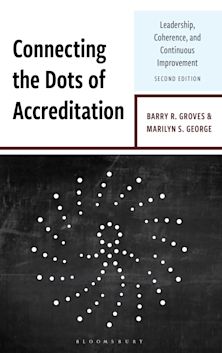- Home
- ACADEMIC
- Education
- Leadership and Management
- Why School Leaders Need Vision
Why School Leaders Need Vision
Managing Scarcity, Mandates, and Conflicting Goals for Educational Quality
Why School Leaders Need Vision
Managing Scarcity, Mandates, and Conflicting Goals for Educational Quality
You must sign in to add this item to your wishlist. Please sign in or create an account
Description
The concept of “visionary” leadership is defined and applied in this book, as “supervision in schools” requires a level of “SUPER VISION” that can be best developed through quality leadership, mentoring -- and mutual ideas, and support -- for adding more value to the school. This book shows just how vision is important and useful in all schools and districts.
Time has thus come to find, build, and use high-quality visionary school leadership in its many dimensions; thus, this book takes at least ten different views (in the chapters) of the visionary roles and functions of education leadership in K-12 -- building on the roles, theories, and visionary actions of key players in the schools. No single perspective is enough, as all views must work in concert to the benefit of teachers and students, today. School leaders, moreover, need to have their own vision about the following: (a) what their work entails; (b) their school should be and look like; and (c) what their staff and students (and schools) can achieve.
Table of Contents
Chapter 1: Visionary Leadership Adds Value—Bruce S. Cooper and Carlos R. McCray
Chapter 2: Building a Collaborative Visionary Community — Karen Andronico
Chapter 3: Visionary School Finance Leadership in a ‘Capped’ Fiscal Environment— Stephen V. Coffin
Chapter 4: Visionary School Leaders for the 21st Century in Special Education—Su-Je Cho, Kwang Sun C. Blair, and Holly Rittenhouse— Cea
Chapter 5: Improving Student Outcomes through Reflective Practice and Mindfulness in Educational Leadership—Lisa Bass
Chapter 6: Diversity: Manifest Destiny? — Floyd D. Beachum & Carlos R. McCray
Chapter 7: Visionary Curriculum: A Journey, not a Destination Selma K. Bartholomew & Ingrid Lafalaise
Chapter 8: Putting Vision into Practice: Exploring Five Timeless Principles for Student Achievement—Jonathan W. Shute
Chapter 9: The Future with Visionary Leadership in Education – Now! — Carlos R. McCray & Bruce S. Cooper
About the Editors
About the Contributors
Product details
| Published | Sep 08 2017 |
|---|---|
| Format | Ebook (PDF) |
| Edition | 1st |
| Extent | 138 |
| ISBN | 9798216248842 |
| Imprint | Rowman & Littlefield |
| Illustrations | 7 BW Illustrations, 7 Tables |
| Publisher | Bloomsbury Publishing |
About the contributors
Reviews
-
Visionary leaders must attend to the everyday functioning of their schools, respond to external policies and political pressures, recognize the weaknesses in the school, and, at the same time, understand the inner- and inter-generational perspectives and strengths of the key stakeholders. Armed with this information from this book, the visionary leader can imagine a different future for the school and its students. Combining the visionary leader’s plan with the collaboration of teachers, parents, and students help to make that vision a reality.
Virginia Roach, Dean, Fordham University
-
Why School Leaders Need Vision is a thoughtful book that cogently illustrates how visionary leadership is the sine qua non in education. Building on the writing of over a dozen authors, the book is filled with insightful and concrete ideas for leaders facing a world of ambiguity and change. It’s a must read for leaders at all organizational levels. To see why Visionary Leadership is more than a catchword, read this book.
Toby Tetenbaum, PhD, Emeritus Professor and Division Chair, Fordham University
-
In this amazing book, the authors have attempted the impossible. They have successfully summarized the most relevant literature on leadership as it intersects with a visionary management style. The book does a magnificent job of capturing the essence of the huge body of theoretical and practical thought produced by the scholarly community. A must read for those who want to have a solid basis for understanding this vital management topic.
Lyndon G. Furst, Dean Emeritus of The School of Graduate Studies, Andrews University



































